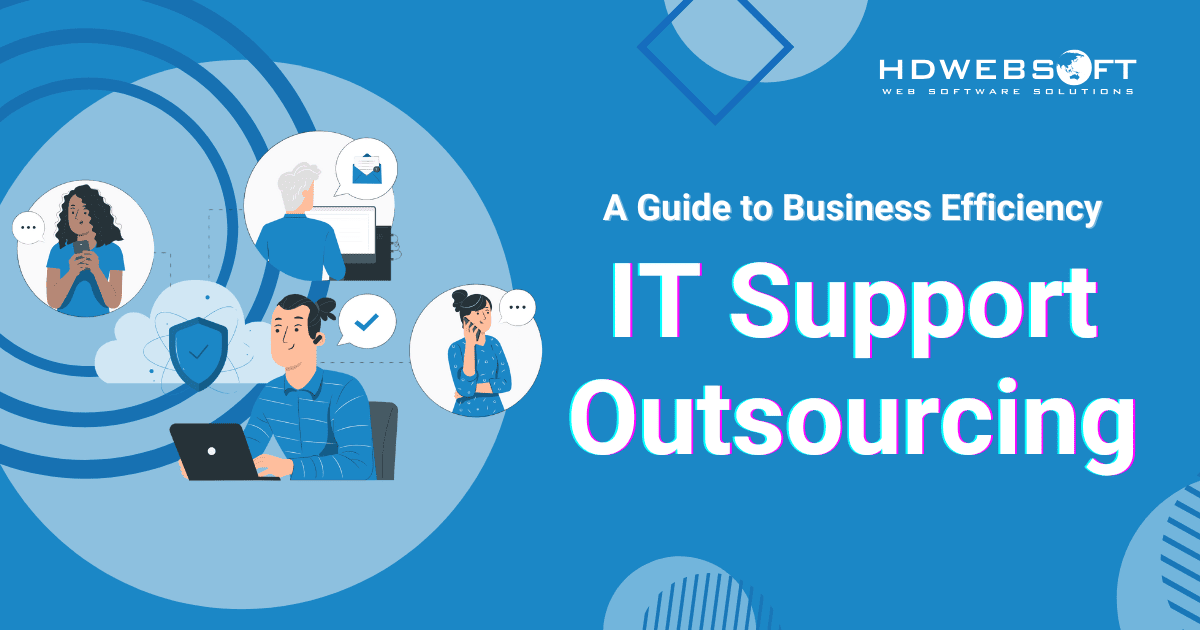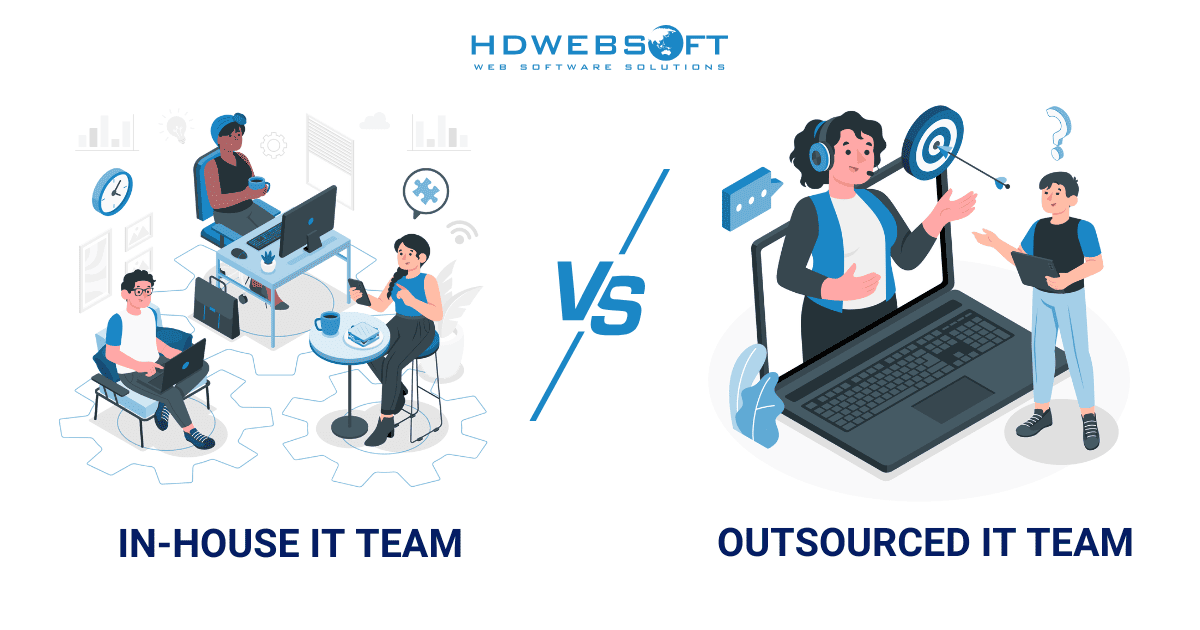
Unlocking Efficiency with IT Support Outsourcing
IT support outsourcing is a powerful strategy for maintaining a competitive edge in business. It enables companies to enhance efficiency while reducing costs. This model ensures a high return on investment, allowing businesses to benefit from 24/7 monitoring and swift issue resolution.
In this article, we’ll discuss different types of IT support services, along with the advantages and disadvantages of outsourcing support. Moreover, you’ll discover the comparison between in-house vs outsourced IT support and the hidden costs associated with the contracts.
Why Outsource IT Support?
Managed IT services offer numerous business advantages, making them a smart choice on multiple levels. With this approach, companies can significantly reduce operational costs and minimize expenses associated with maintaining an in-house IT support team. Furthermore, there’s no need to invest heavily in IT infrastructure management, as the service provider handles it efficiently.
Beyond cost savings, the Service Level Agreement for remote IT support outsourcing also ensures scalability and access to specialized expertise. However, the benefits go beyond mere cost reduction. Outsourcing IT support enhances overall IT performance, allowing the internal team to focus on core business objectives and drive success.
Different Types of IT Support Services
Outsourced IT support has become a strategic advantage for businesses seeking expertise and efficiency. By partnering with skilled third-party vendors, companies can access a range of IT services. This approach not only reduces operational burdens but also allows businesses to allocate resources toward growth and innovation. Let’s dive in.
Tech Support and Help Desk
A well-structured outsourced IT support model ensures 24/7 technical assistance, minimizing downtime and keeping operations smooth. With an advanced ticketing system, service requests are efficiently managed, leading to faster issue resolution and improved workflows.
Remote desktop support further enhances efficiency by enabling instant system access for troubleshooting, eliminating the need for on-site interventions. Additionally, Mobile Device Management (MDM) strengthens security by enforcing policies on company-issued devices, which is particularly beneficial for complex IT infrastructures. Therefore, businesses leveraging IT support outsourcing help desks gain access to specialized troubleshooting expertise. Ultimately, areas such as hardware issues, account provisioning, and system de-provisioning are fully covered.
Network Management and Security
As a matter of fact, a robust IT infrastructure requires proactive network management. That’s the area where IT support providers play a crucial role in safeguarding businesses from cyber threats. They handle firewall management, VPN configuration, security protocol enforcement, and Security as a Service, ensuring that critical data remains protected.
Continuous network monitoring allows for real-time vulnerability detection, preventing security breaches before they escalate. A dedicated Security Operations Center (SOC) further strengthens protection by identifying and mitigating emerging risks. In addition, outsourced technical providers optimize bandwidth usage, reducing network interruptions and ensuring smooth communication.
Hence, partnering with managed security service providers allows businesses to focus on core operations while maintaining a secure and resilient IT environment.
Cloud Services Management
Recently, as cloud computing has become a business necessity, IT support outsourcing for cloud services is essential. Expert providers facilitate cloud migrations, hosting, and optimization across platforms like AWS, Google Cloud, and Azure. They also implement security protocols to ensure compliance with standards such as GDPR and ISO 27001.
Data backup and disaster recovery solutions are integral to minimizing downtime. By securing cloud-based infrastructure, outsourced IT teams help businesses maintain high availability. Moreover, cloud performance optimization reduces latency and enhances cost efficiency. Automated account provisioning and de-provisioning further streamline user access management, making businesses more agile and secure in the digital landscape.
Cybersecurity Services
With the rise of digital threats, cybersecurity must be a top priority. IT support service firms offer proactive threat detection and response, ensuring that businesses remain secure. Through regular penetration testing and vulnerability assessments, outsourced providers help organizations identify and mitigate risks effectively.
Endpoint protection, SOC integration, and compliance with security frameworks further enhance cybersecurity posture. In addition, IT support outsourcing teams handle firewall configurations, malware prevention, and other security essentials, allowing businesses to stay ahead of evolving cyber threats with expert-driven protection.
Further Reading: Top 10 Cybersecurity Best Practices for Small Business in 2025.
Data Backup & Disaster Recovery
Reliable data protection is critical for business continuity, and outsourcing IT support ensures that companies have backup and recovery solutions. Automated backups with secure storage minimize the risk of data loss due to cyber incidents, hardware failures, or human errors.
When the time calls for backup and recovery, the IT support outsourcing team can assist you with professionalism.
For starters, a comprehensive disaster recovery plan allows organizations to respond effectively to unexpected disruptions. Rapid data restoration, enabled by outsourcing, significantly reduces downtime and financial losses. Furthermore, advanced encryption measures secure critical business data, though they’re often unavailable to in-house teams. As a result, they make sure that only authorized personnel can access it.
IT Infrastructure Management
Managing IT infrastructure requires specialized expertise, and IT support outsourcing simplifies server setup, software maintenance, and system updates. Namely, third-party providers are responsible for handling hardware acquisition, software licensing, and lifecycle management, ensuring seamless IT operations.
Regular software updates and MDM keep business systems secure and compliant. Additionally, outsourced IT teams support network infrastructure, optimizing data flow and reducing communication delays. Thus, automated account provisioning and de-provisioning enhance security by managing user privileges efficiently.
By outsourcing IT infrastructure management, companies cut operational expenses while maintaining high system performance and reliability.
Advantages of IT Support Outsourcing
Outsourcing IT support offers numerous benefits, making it a strategic choice for businesses. Below are some of the most significant advantages of this approach.
Cost Optimization and Financial Flexibility
By choosing to outsource, businesses can significantly lower operational expenses. Eliminating the need for in-house IT staff reduces costs associated with salaries, training, and infrastructure investments. Additionally, IT support outsourcing removes the burden of ongoing hardware and software upgrades, so businesses are free to allocate resources effectively.
Another major advantage is the flexible pricing models that outsourcing offers. Companies can shift from fixed IT expenses to variable costs, paying only for the specific services they require. This adaptability is why many businesses embrace outsourcing.
In fact, a report highlights that 70% of British B2B companies outsource critical business operations, with 34% outsourcing IT support. Thereby, it becomes one of the most commonly delegated outsourced services.
Access to Highly Specialized IT Expertise
The rapid evolution of technology demands continuous adaptation in areas such as IT infrastructure management, cloud computing, and cybersecurity. However, keeping an in-house team up to date with these advancements requires substantial investment in training and certifications.
With outsourced technical support, companies gain access to highly skilled professionals with industry-recognized certifications like CompTIA and CISSP. These experts ensure IT systems remain secure, compliant, and future-ready.
Rather than hiring multiple specialists for different IT needs, businesses can leverage a single, dedicated team proficient in the field. Indeed, IT support outsourcing companies’ expertise lies in AI-driven IT automation, cybersecurity, network security, and application modernization. Thus, not only does operational efficiency get enhanced, but it also ensures compliance with the latest industry standards. The best thing is the overhead costs of in-house hiring and retention are actually gone.
An IT support outsourcing software company is like an all-in-one package.
Continuous Monitoring and Rapid Issue Resolution
Unplanned IT downtime can disrupt operations, leading to financial losses and potential security breaches. A key benefit of outsourcing IT support is 24/7 monitoring and proactive issue detection. Resultantly, this constant vigilance prevents minor technical problems from escalating into major disruptions.
Plus, AI-powered tools play a crucial role in outsourced IT services by continuously scanning for technical risks. Hence, this real-time detection and response capability ensures smooth business operations and mitigates potential risks before they impact productivity.
Enhanced Focus on Core Business Operations
Managing IT infrastructure in-house can divert valuable time and resources away from essential business functions. IT support outsourcing allows internal teams to concentrate on growth, innovation, and customer engagement instead of dealing with IT-related troubleshooting.
By partnering with an outsourced IT provider, businesses can streamline their operations with cloud-based IT solutions and managed IT services. Clearly, this model enhances efficiency and agility, enabling companies to adapt quickly to market demands.
Particularly, e-commerce giants like Alibaba rely on outsourced cloud-based IT support to handle massive website traffic during peak shopping periods. Alibaba’s system, for instance, processes over 544,000 orders per second during peak events. With experts managing IT operations, businesses can focus on strategic growth while maintaining a reliable and secure IT infrastructure.
Disadvantages of Outsourcing IT Support
The success of IT support outsourcing largely depends on careful planning and execution. However, several risks and challenges can arise if businesses fail to establish a solid vendor management strategy.
Data Security and Privacy Risks
Entrusting IT operations to third-party providers comes with potential security vulnerabilities. If the outsourcing partner lacks robust cybersecurity measures, organizations may face the risk of exposing sensitive information. Additionally, non-compliance with regulations like GDPR or SOC 2 can lead to legal and financial repercussions.
The lack of security measures in IT support outsourcing can expose businesses to data and privacy risks.
To mitigate these risks, companies should implement strict data encryption, enforce role-based access control, and define security responsibilities in contractual agreements. A strong legal framework ensures accountability and safeguards confidential business data.
Specifically, an Indonesian digital payments company strengthened its cybersecurity by adopting NIST SP 800-53 protocols, enhancing its fraud detection capabilities. As a result, fraud attempts dropped by 35%, demonstrating the importance of proactive security measures in outsourcing.
Communication Challenges and Response Delays
A common obstacle in IT support outsourcing is ensuring seamless communication. This is particularly noticeable when working with offshore teams across different time zones. Language barriers, cultural differences, and lack of real-time collaboration can slow down response times and lead to misunderstandings.
To prevent miscommunication, companies should establish clear SLAs that define response time expectations. Implementing collaboration tools like Microsoft Teams or Slack can facilitate instant communication. Meanwhile, don’t forget to schedule check-ins to help maintain project transparency and efficiency.
See how HDWEBSOFT works with clients in time zone differences.
Vendor Reliability and Service Quality
Choosing the right IT service provider is crucial, as an unreliable vendor can disrupt operations. From then, they introduce hidden costs, or create vendor lock-in scenarios where switching providers becomes costly and difficult. Thus, poorly structured SLAs may also leave businesses vulnerable to subpar service without proper recourse.
To avoid these pitfalls, organizations must conduct thorough background checks on IT support outsourcing vendors. The popular methods are to assess their track record and negotiate SLAs with clear performance metrics, including uptime guarantees and issue resolution times. In addition, incorporating penalty clauses for non-compliance helps maintain service accountability.
A great example of vendor management success is Cisco’s Vendor Management Office (VMO). In 2002, Cisco introduced a centralized VMO to oversee IT hardware and telecom service providers. Within three quarters of the 2004 fiscal year, this initiative resulted in $33 million in IT cost savings and avoidance.
Cost Analysis: In-House vs. Outsourced IT Support

As you may acknowledge, expenses can greatly impact IT support outsourcing. So, let us walk you through the analysis or cost between in-house vs outsourced teams.
| Aspect | In-House IT Support | Outsourced IT Support |
| Salary & Employee Benefits | Requires significant investment in wages, training, and employee perks. | No direct payroll expenses, as staffing is managed externally. |
| IT Infrastructure & Software | Demands substantial upfront costs for hardware, software, and upkeep. | Utilizes third-party infrastructure with flexible and scalable options. |
| Hiring & Workforce Training | High recruitment, onboarding, and continuous training expenses. | Eliminates hiring concerns; vendors supply skilled professionals. |
| Operational Expenses | Costs accumulate from office space, power consumption, and equipment upgrades. | Service providers handle infrastructure and overhead, lowering costs. |
| Security & Regulatory Compliance | Dedicated specialists are required to ensure cybersecurity and compliance. | Vendors have expertise in industry regulations and security standards. |
| Scalability & Growth | Expanding requires time and money due to hiring and training processes. | Offers immediate scalability without additional resource allocation. |
| Disaster Recovery & System Reliability | Limited real-time monitoring leads to slower recovery from failures. | Continuous system monitoring with structured recovery solutions. |
| Support & Response Time | May experience delays due to limited staffing, especially outside work hours. | 24/7 support with service-level agreements, ensuring fast resolution. |
Unexpected Costs in Outsourcing Contracts
When evaluating the Total Cost of Ownership (TCO) in IT support outsourcing, consider these hidden expenses that might arise in the software outsourcing contract:
- Onboarding Costs: Factor in expenses related to data migration and initial setup. Remember to establish clear transition terms upfront to avoid unexpected fees.
- Scope Creep: Ensure SLAs precisely outline the scope of services to prevent vague agreements that may lead to additional costs.
- Vendor Lock-in: Negotiate flexible contracts with defined exit strategies to minimize long-term dependence on a single provider.
- Compliance Expenses: Account for costs related to regulatory compliance and cybersecurity requirements. For your information, choosing certified vendors can help optimize these expenses.
Conclusion
IT support outsourcing has become a game-changer for businesses seeking a competitive advantage. This post explored its key benefits, such as cost savings and access to specialized expertise. While challenges like security risks exist, they can be effectively managed with the right strategies. Therefore, choosing the right outsourcing company is one important decision that businesses must make.
Looking to streamline IT operations through outsourcing? Partner with HDWEBSOFT and leverage our expertise to optimize your IT support services.














